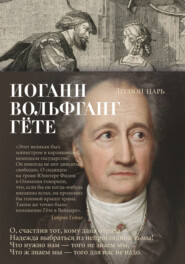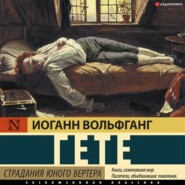По всем вопросам обращайтесь на: info@litportal.ru
(©) 2003-2025.
✖
Wilhelm Meister's Apprenticeship and Travels, Vol. I (of 2)
Настройки чтения
Размер шрифта
Высота строк
Поля
Serlo assented; and both were of opinion, that, as the play was now to be produced upon the German stage, this more serious and simple background was the best adapted for the German mind.
The parts had been distributed before: Serlo undertook Polonius; Aurelia, Ophelia; Laertes was already designated by his name; a young, thick-set, jolly new-comer was to be Horatio; the King and Ghost alone occasioned some perplexity, for both of these no one but Old Boisterous remaining. Serlo proposed to make the Pedant, King; but against this our friend protested in the strongest terms. They could resolve on nothing.
Wilhelm had also allowed both Rosencrantz and Guildenstern to continue in his play. "Why not compress them into one?" said Serlo. "This abbreviation will not cost you much."
"Heaven keep me from all such curtailments!" answered Wilhelm: "they destroy at once the sense and the effect. What these two persons are and do it is impossible to represent by one. In such small matters we discover Shakspeare's greatness. These soft approaches, this smirking and bowing, this assenting, wheedling, flattering, this whisking agility, this wagging of the tail, this allness and emptiness, this legal knavery, this ineptitude and insipidity, – how can they be expressed by a single man? There ought to be at least a dozen of these people, if they could be had; for it is only in society that they are any thing; they are society itself; and Shakspeare showed no little wisdom and discernment in bringing in a pair of them. Besides, I need them as a couple that may be contrasted with the single, noble, excellent Horatio."
"I understand you," answered Serlo, "and we can arrange it. One of them we shall hand over to Elmira, Old Boisterous's eldest daughter: it will all be right, if they look well enough; and I will deck and trim the puppets so that it shall be first-rate fun to behold them."
Philina was rejoicing not a little, that she had to act the Duchess in the small subordinate play. "I will show it so natural," cried she, "how you wed a second husband, without loss of time, when you have loved the first immensely. I mean to win the loudest plaudits, and every man shall wish to be the third."
Aurelia gave a frown: her spleen against Philina was increasing every day.
"'Tis a pity, I declare," said Serlo, "that we have no ballet; else you should dance me a pas de deux with your first, and then another with your second husband, – and the first might dance himself to sleep by the measure; and your bits of feet and ankles would look so pretty, tripping to and fro upon the side stage."
"Of my ankles you do not know much," replied she pertly; "and as to my bits of feet," cried she, hastily reaching below the table, pulling off her slippers, and holding them together out to Serlo, "here are the cases of them; and I challenge you to find me more dainty ones."
"I was in earnest," said he, looking at the elegant half-shoes. "In truth, one does not often meet with any thing so dainty."
They were of Parisian workmanship: Philina had received them as a present from the countess, a lady whose foot was celebrated for its beauty.
"A charming thing!" cried Serlo: "my heart leaps at the sight of them."
"What gallant throbs!" replied Philina.
"There is nothing in the world beyond a pair of slippers," said he, "of such pretty manufacture, in their proper time and place, when" —
Philina took her slippers from his hands, crying, "You have squeezed them all! They are far too wide for me!" She played with them, and rubbed the soles of them together. "How hot it is!" cried she, clapping the sole upon her cheek, then again rubbing, and holding it to Serlo. He was innocent enough to stretch out his hand to feel the warmth. "Clip! clap!" cried she, giving him a smart rap over the knuckles with the heel; so that he screamed, and drew back his hand. "That's for indulging in thoughts of your own at the sight of my slippers."
"And that's for using old folk like children," cried the other; then sprang up, seized her, and plundered many a kiss, every one of which she artfully contested with a show of serious reluctance. In this romping, her long hair got loose, and floated round the group; the chair overset; and Aurelia, inwardly indignant at such rioting, arose in great vexation.
CHAPTER VI
Though in this remoulding of "Hamlet" many characters had been cut off, a sufficient number of them still remained, – a number which the company was scarcely adequate to meet.
"If this is the way of it," said Serlo, "our prompter himself must issue from his den, and mount the stage, and become a personage like one of us."
"In his own station," answered Wilhelm, "I have frequently admired him."
"I do not think," said Serlo, "that there is in the world a more perfect artist of his kind. No spectator ever hears him: we upon the stage catch every syllable. He has formed in himself, as it were, a peculiar set of vocal organs for this purpose: he is like a Genius that whispers intelligibly to us in the hour of need. He feels, as if by instinct, what portion of his task an actor is completely master of, and anticipates from afar where his memory will fail him. I have known cases in which I myself had scarcely read my part: he said it over to me word for word, and I played happily. Yet he has some peculiarities which would make another in his place quite useless. For example, he takes such an interest in the plays, that, in giving any moving passage, he does not indeed declaim it, but he reads it with all pomp and pathos. By this ill habit he has nonplussed me on more than one occasion."
"As with another of his singularities," observed Aurelia, "he once left me sticking fast in a very dangerous passage."
"How could this happen, with the man's attentiveness?" said Wilhelm.
"He is so affected," said Aurelia, "by certain passages, that he weeps warm tears, and for a few moments loses all reflection; and it is not properly passages such as we should call affecting that produce this impression on him; but, if I express myself clearly, the beautiful passages, those out of which the pure spirit of the poet looks forth, as it were, through open, sparkling eyes, – passages which others at most rejoice over, and which many thousands altogether overlook."
"And with a soul so tender, why does he never venture on the stage?"
"A hoarse voice," said Serlo, "and a stiff carriage, exclude him from it; as his melancholic temper excludes him from society. What trouble have I taken, and in vain, to make him take to me! But he is a charming reader; such another I have never heard; no one can observe like him the narrow limit between declamation and graceful recital."
"The very man!" exclaimed our friend, "the very man! What a fortunate discovery! We have now the proper hand for delivering the passage of 'The rugged Pyrrhus.'"
"One requires your eagerness," said Serlo, "before he can employ every object in the use it was meant for."
"In truth," said Wilhelm, "I was very much afraid we should be obliged to leave this passage out: the omission would have lamed the whole play."
"Well! That is what I cannot understand," observed Aurelia.
"I hope you will erelong be of my opinion," answered Wilhelm. "Shakspeare has introduced these travelling players with a double purpose. The person who recites the death of Priam with such feeling, in the first place, makes a deep impression on the prince himself; he sharpens the conscience of the wavering youth: and, accordingly, this scene becomes a prelude to that other, where, in the second place, the little play produces such effect upon the King. Hamlet sees himself reproved and put to shame by the player, who feels so deep a sympathy in foreign and fictitious woes; and the thought of making an experiment upon the conscience of his stepfather is in consequence suggested to him. What a royal monologue is that, which ends the second act! How charming it will be to speak it!
"'Oh, what a rogue and peasant slave am I!
Is it not monstrous that this player here,
But in a fiction, in a dream of passion,
Could force his soul so to his own conceit,
That, from her working, all his visage wann'd;
Tears in his eyes, distraction in's aspect,
A broken voice, and his whole function suiting
With forms to his conceit? and all for nothing!
For Hecuba!
What's Hecuba to him, or he to Hecuba,
That he should weep for her?'"
"If we can but persuade our man to come upon the stage," observed Aurelia.
"We must lead him to it by degrees," said Serlo. "At the rehearsal he may read the passage: we shall tell him that an actor whom we are expecting is to play it; and so, by and by, we shall lead him nearer to the point."
Having agreed on this affair, the conversation next turned upon the Ghost. Wilhelm could not bring himself to give the part of the living King to the Pedant, that so Old Boisterous might play the Ghost: he was of opinion that they ought to wait a while; because some other actors had announced themselves, and among these it was probable they would find a fitter man.
We can easily conceive, then, how astonished Wilhelm must have been when, returning home that evening, he found a billet lying on his table, sealed with singular figures, and containing what follows: —
"Strange youth! we know thou art in great perplexity. For thy Hamlet thou canst hardly find men enough, not to speak of ghosts. Thy zeal deserves a miracle: miracles we cannot work, but somewhat marvellous shall happen. If thou have faith, the Ghost shall arise at the proper hour! Be of courage and keep firm! This needs no answer: thy determination will be known to us."
With this curious sheet he hastened back to Serlo, who read and re-read it, and at last declared, with a thoughtful look, that it seemed a matter of some moment; that they must consider well and seriously whether they could risk it. They talked the subject over at some length; Aurelia was silent, only smiling now and then; and a few days after, when speaking of the incident again, she gave our friend, not obscurely, to understand that she held it all a joke of Serlo's. She desired him to cast away anxiety, and to expect the Ghost with patience.
Serlo, for most part, was in excellent humor: the actors that were going to leave him took all possible pains to play well, that their absence might be much regretted; and this, combined with the new-fangled zeal of the others, gave promise of the best results.
His intercourse with Wilhelm had not failed to exert some influence on him. He began to speak more about art: for, after all, he was a German; and Germans like to give themselves account of what they do. Wilhelm wrote down many of their conversations; which, as our narrative must not be so often interrupted here, we shall communicate to such of our readers as feel an interest in dramaturgic matters, by some other opportunity.
In particular, one evening, the manager was very merry in speaking of the part of Polonius, and how he meant to take it up. "I engage," said he, "on this occasion, to present a very meritorious person in his best aspect. The repose and security of this old gentleman, his emptiness and his significance, his exterior gracefulness and interior meanness, his frankness and sycophancy, his sincere roguery and deceitful truth, I will introduce with all due elegance in their fit proportions. This respectable, gray-haired, enduring, time-serving half-knave, I will represent in the most courtly style: the occasional roughness and coarseness of our author's strokes will further me here. I will speak like a book when I am prepared beforehand, and like an ass when I utter the overflowings of my heart. I will be insipid and absurd enough to chime in with every one, and acute enough never to observe when people make a mock of me. I have seldom taken up a part with so much zeal and roguishness."
"Could I but hope as much from mine!" exclaimed Aurelia. "I have neither youth nor softness enough to be at home in this character. One thing alone I am too sure of, – the feeling that turns Ophelia's brain, I shall not want."
"We must not take the matter up so strictly," said our friend. "For my share, I am certain, that the wish to act the character of Hamlet has led me exceedingly astray, throughout my study of the play. And now, the more I look into the part, the more clearly do I see, that, in my whole form and physiognomy, there is not one feature such as Shakspeare meant for Hamlet. When I consider with what nicety the various circumstances are adapted to each other, I can scarcely hope to produce even a tolerable effect."
"You are entering on your new career with becoming conscientiousness," said Serlo. "The actor fits himself to his part as he can, and the part to him as it must. But how has Shakspeare drawn his Hamlet? Is he so utterly unlike you?"
"In the first place," answered Wilhelm, "he is fair-haired."

















